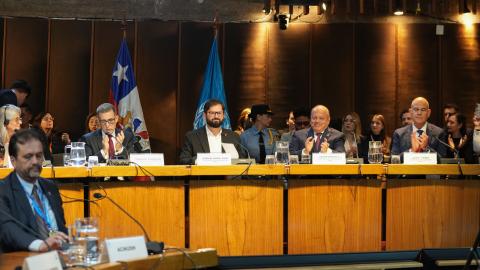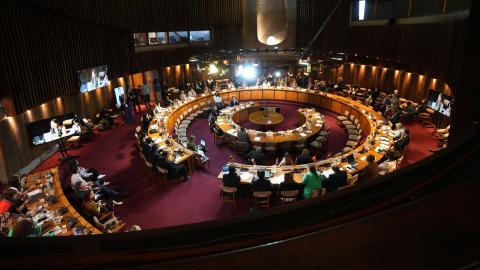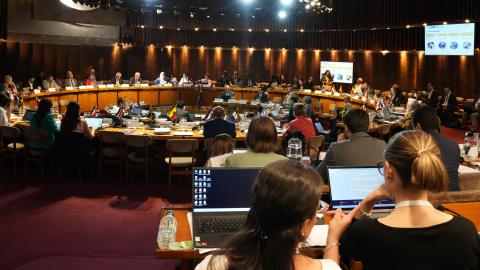Press Release
In the current world context, the countries of the Caribbean must focus on closing the structural gaps they still have, particularly with regard to gender equality, financial and fiscal sustainability (due to their high debt level), and mitigating the effects of climate change, in order to meet the commitments adopted under the 2030 Sustainable Development Agenda and its 17 Goals (SDGs). This was pointed out by Alicia Bárcena, Executive Secretary for the Economic Commission for Latin America and the Caribbean (ECLAC) during an event held in New York.
The international senior official was the keynote speaker in the “African-Caribbean Cross-Regional Exchange” this Wednesday at the High-Level Political Forum (HLPF) taking place through July 19 at United Nations Headquarters.
“The current development model is unsustainable in that it has led to a decrease in trade and growth, greater inequality, excessive financialization, and has fallen into the greatest market failure of all: climate change. The Sustainable Development Goals (SDGs) have thus come about as an aspirational response with a view to the long term,” remarked Bárcena.
“In order to meet the SDGs, ECLAC proposes a great environmental push, a change in productive structures via industrialization, innovation and the incorporation of greater knowledge,” she added.
The event was focused on dialogue around proposals of heterodox and feminist policies related to debt, climate change and gender equality in Africa and the Caribbean presented in several academic studies. It was organized by the initiative Regions Refocus (of the Dag Hammarskjöld Foundation, with headquarters in Sweden), the German political foundation Friedrich-Ebert-Stiftung (FES) and the Jamaica Permanent Mission to the United Nations.
Participants in the dialogue included Ambassador Courtenay Rattray, Representative for the Jamaica Permanent Mission to the UN; Ambassador Pennelope Beckles of Trinidad and Tobago; Ambassador Keith Hamilton Lewellyn Marshall of Barbados, and other Caribbean and African Ambassadors to the United Nations; Anita Nayar of Regions Refocus; and Caecilie Schildberg of FES, among other figures.
In her remarks, ECLAC’s Executive Secretary said that in order to implement the 2030 Agenda, develop their national institutional frameworks to follow it and mainstream the SDGs into their plans and policies, it is essential that the countries of the Caribbean know the challenges they face in the current global context in terms of trade flows and accords, access to financing and mobilization of resources, and technology.
“We must equalize to grow and grow to equalize, fostering investment and gender equality,” said Alicia Bárcena.
On this last point, she stated that the main issue is assuring women’s autonomy in its three dimensions: economic, physical and political. In the Caribbean, women tend to be overrepresented in the lowest sectors of the labor market – especially in the service sector – and underrepresented in areas that require higher qualifications, she explained.
Furthermore, the unemployment rate is higher among women, who also suffer lower levels of social protection and have lower salaries compared to men (in similar positions). “Much more needs to be done to completely capitalize on women’s potential, requiring methods that encompass their access to education and quality training, to economic resources and financial services, and to new forms of financing,” Bárcena underscored. “We must move from a culture of privilege to a culture of equality,” she remarked.
With regard to climate change, the ECLAC senior authority asserted that the small island States of the Caribbean are more susceptible than other continental areas to the severe consequences related to increasing sea levels and natural disasters. She pointed out that in the past 40 years, it is estimated that such disasters have cost nearly 5% of the sub-region’s GDP.
Moreover, macroeconomic conditions have led many countries of the Caribbean to considerably increase their debt levels in the 2012-2016 period, with some cases surpassing 100% of their GDP. “For this reason, ECLAC has launched a debt-relief proposal for the English-speaking Caribbean through the creation of a prevention fund for mitigating the consequences of climate change in their economies,” she said.
Bárcena emphasized that any debt-relief situation that avoids contractions in social spending and allows for responsible fiscal adjustments will be beneficial toward reducing the persistent inequalities in the sub-region, especially in terms of gender. She stressed that this is exacerbated by the “graduation” problem of many Caribbean countries, which are of middle income and thus limited in their access to preferential financial and trade measures.
“Proposals such as the one by ECLAC to establish a prevention fund to stimulate “green” investments and shore up competition and productivity in the Caribbean will deliver much needed diversification as a means for reducing economic vulnerability, and will spur economic growth by putting the Caribbean on a sustainable path to achieving the SDGs,” stated Bárcena in closing.



